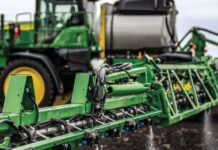Sept. 8, 2020
New K-State agronomy center enhances learning environment
Building opened in 2019 after years in the planning
MANHATTAN, Kan. – A new building on Kansas State University’s north campus has made it possible for students to more effectively learn about crops and farm equipment, plus provides a place for large gatherings.
K-State professor of weed ecology Anita Dille said the new classroom and exhibition space, which opened in August, 2019 provides insurance in inclement weather: “Whether it’s raining, or really hot or cold outdoors, we are no longer at the whims of nature. It’s a vast improvement over standing in a 102-degree machine shed with poor lighting and trying to show a group of students the proper ways to identify plants or how to adjust or maintain equipment.”
The new center not only enhances the university’s classroom teaching with students, but also serves as a connection to the community, state and beyond by providing indoor space to hold extension field days and workshops for farmers in a climate controlled, well-lighted setting.
COVID-19 has curtailed larger gatherings for now, but once that changes, the building will be used to host larger events such as the “Kids Field Day on the Agronomy Farm.” That’s a day when K-State hosts more than 600 fourth graders who come with their teachers to learn about agronomic and horticulture crops, livestock, soils, insects, water quality and more.
In the meantime, Dille said, multiple classes incorporating hands-on learning are using the new space.
The 5,750-square-foot building includes two classrooms and an exhibition hall, plus a foyer, restrooms and large windows that look out over the Agronomy Farm fields.
Dille, who serves as the Department of Agronomy’s assistant head for teaching, said she’s now able to bring equipment indoors into the exhibition area to show students the proper way to calibrate sprayers, for example – a huge improvement to standing outside in brutal heat or driving rain. The weekly Crop Growth and Development labs meet in the center, plus faculty members teach planter calibration and more in the space.
“One of the ways to enhance education in the field is to have this learning center right next door,” she said. “We placed it at the Agronomy Farm so we can just step outside and be right out there in our own fields.”
And that means that students and professors can be discussing something in class about a problem in wheat, for instance, and walk right outside to a wheat field to see firsthand what the discussion is about. Next door are teaching gardens for weeds, forages and crops; and other demonstration plots.
Prior to the center’s construction, the Agronomy Farm was already hosting more than 3,000 people a year through formal classes, workshops, visits and tours. The new center increases the university’s ability to offer those programs and activities.
# # #
Sidebar
Kansas State University Agronomy Education Center facts
- Completed and opened in 2019 – started holding classes in fall, 2019.
- Climate controlled for year-round use.
- Overall building dimensions Are 50 x 125 feet and 5,750 square feet
- Audio/visual capabilities in classrooms and exhibition hall
- Two 600-square-foot classrooms with capacity of 30 students each or can be opened up to accommodate 60.
- Large, 3,200 square-foot exhibition hall that can hold 200+ people and accommodates equipment for hands-on learning.
- Restrooms, foyer, and storage closets.
- Built at a cost of $1.5 to $1.6 million.
- Funded by donations from private individuals, crop commissions, and industry. For more information contact the Department of Agronomy at 785-532-6101.
FOR PRINT PUBLICATIONS: Links used in this article
Kansas State University Department of Agronomy https://www.agronomy.k-state.edu/
K‑State Research and Extension is a short name for the Kansas State University Agricultural Experiment Station and Cooperative Extension Service, a program designed to generate and distribute useful knowledge for the well‑being of Kansans. Supported by county, state, federal and private funds, the program has county extension offices, experiment fields, area extension offices and regional research centers statewide. Its headquarters is on the K‑State campus in Manhattan. For more information, visit www.ksre.ksu.edu. K-State Research and Extension is an equal opportunity provider and employer.
For more information:
Anita Dille
Written by:
Mary Lou Peter




